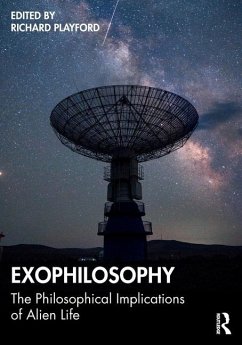This volume addresses philosophical questions raised by the possibility of alien life and extraterrestrial intelligence. The different philosophical perspectives and approaches presented across the chapters will provide a foundation for future work on exophilosophy.
Interest in space, space exploration, and alien life has never been greater. In popular culture, for example, it has proven a persistent theme in science fiction films (e.g., Star Trek, Star Wars), books (e.g., H. G. Wells, Arthur C. Clarke, Ray Bradbury), and computer games (e.g., Sid Meier's Alpha Centauri), as well as bestselling 'non- fiction' books (von Däniken's multimillion-selling Chariots of the Gods?), and hit 'documentary' shows (e.g., Ancient Aliens). There has also been persistent interest in these topics amongst scientists with organizations such as NASA and SETI having an enormous impact on both the scientific and popular imagination. Yet, curiously, the topic has received relatively little philosophical attention. Whilst certain aspects of these topics remain within the proper purview of the sciences, a host of philosophical questions are raised by the possibility of alien life and extraterrestrial intelligences, and the possibility of our coming into contact with them. This collection of essays will examine some of these questions whilst laying the groundwork for future study in an as-yet under-researched area of philosophy.
Exophilosophy is essential reading for scholars and students with an interest in space and philosophy, especially those working in philosophy of science, metaphysics, epistemology, ethics, philosophy of language, and philosophy of religion.
Interest in space, space exploration, and alien life has never been greater. In popular culture, for example, it has proven a persistent theme in science fiction films (e.g., Star Trek, Star Wars), books (e.g., H. G. Wells, Arthur C. Clarke, Ray Bradbury), and computer games (e.g., Sid Meier's Alpha Centauri), as well as bestselling 'non- fiction' books (von Däniken's multimillion-selling Chariots of the Gods?), and hit 'documentary' shows (e.g., Ancient Aliens). There has also been persistent interest in these topics amongst scientists with organizations such as NASA and SETI having an enormous impact on both the scientific and popular imagination. Yet, curiously, the topic has received relatively little philosophical attention. Whilst certain aspects of these topics remain within the proper purview of the sciences, a host of philosophical questions are raised by the possibility of alien life and extraterrestrial intelligences, and the possibility of our coming into contact with them. This collection of essays will examine some of these questions whilst laying the groundwork for future study in an as-yet under-researched area of philosophy.
Exophilosophy is essential reading for scholars and students with an interest in space and philosophy, especially those working in philosophy of science, metaphysics, epistemology, ethics, philosophy of language, and philosophy of religion.
"The philosophical significance of discovering life beyond Earth is both haunting and immense. This book is a wonderful advancement of current discourse on the philosophical implications of extraterrestrial life."
Andrew M. Davis, The Center for Process Studies, Claremont School of Theology, USA
Andrew M. Davis, The Center for Process Studies, Claremont School of Theology, USA









